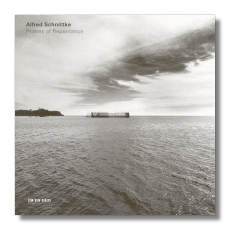
The Internet's Premier Classical Music Source
Related Links
- Schnittke Reviews
- Latest Reviews
- More Reviews
-
By Composer
-
Collections
DVD & Blu-ray
Books
Concert Reviews
Articles/Interviews
Software
Audio
Search Amazon
Recommended Links
Site News
 CD Review
CD Review
Alfred Schnittke

Psalms of Repentance
Per Björsund & Leif Aruhn-Solén, tenors
Swedish Radio Choir/Tõnu Kaljuste
ECM New Series 1583 (453513-2) DDD 53:01
Alfred Schnittke's death last year took from the world a composer whose restless intellectual spirit was like the grain of sand that irritates the oyster into making a pearl. One was seldom exactly sure where Schnittke was "coming from"; his aggressive polystylism embraced everything from serialism to flights of neo-Baroque fancy. In the last stage of his career, the composer, plagued by bad health, wrote some of his most fearful and challenging music. The Psalms of Repentance, completed in 1988 and premièred that December in Moscow, are dark indeed, but Schnittke never lets the last candle of faith be extinguished, and it is both the candle and the dark that fascinate us as we hear this work. Schnittke's wrote it to celebrate a thousand years of Russian Christianity. His choice of an unaccompanied chorus is appropriate, given the ban on instrumental music in the Byzantine church.
The anonymous texts come from 16th-century Russia. Their subjects range from Adam's grief over his expulsion from the Garden of Eden to a reflection on the historical fratricide in the year 1015 that gave rise to Russia's first saints. ECM's booklet prints the texts in Cyrillic, and then follows them with translations in English and German, so it is difficult to follow them and appreciate Schnittke's specific response to the words. From what one can deduce, however, the composer has responded to the texts with exquisite sensitivity. In spite of the intensely introspective and almost unrelievedly despairing subject matter, Schnittke's settings are full of color and variety, within appropriate boundaries. The composer had converted to Roman Catholicism in 1982, and the Psalms of Repentance, like the other spiritual works from the last phase of his career, are galvanized with a convert's fervor.
Stylistically, the twelve Psalms of Repentance are a blend of the old and new. The declamatory singing and open parallel chords of the Byzantine and Russian Orthodox churches can be heard in this work. Schnittke also treats the chorus instrumentally. At several points in the work the basses are asked to create a drone effect by singing with closed mouths. Modern techniques such as tone clusters and glissandi are used, but not gratuitously; they play specific expressive roles. On occasion, tenor soloists come to the fore, an effect that is almost cantorial. Because of their variety, the Psalms of Repentance do sound like a retrospective of everything that was rich and intriguing about Schnittke's writing.
I have not heard the Chandos recording (with a Danish choir) of this work, but Chandos does offer another work (Voices of Nature) on the same disc. It is difficult, however, to imagine not wanting to take an extended pause for reflection after hearing the Psalms. The Swedish Radio Choir and its Estonian conductor have a long reputation for responding with expert dedication to scores such as Schnittke's and there's no disappointment here; these are luminous performances, and ECM's recording intensifies their light. As always, ECM's presentation is aesthetically pleasing, and this release is enthusiastically recommended as another example of their beautiful sense of style, in the least pejorative sense of the word.
Copyright © 1999, Raymond Tuttle


















